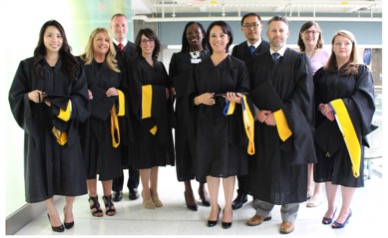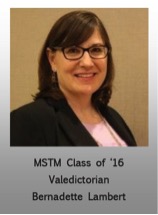By Bernadette Lambert, JD
In June 2016, I had the privilege of representing San Jose State University at the Eno Center for Transportation’s Future Leaders Development Conference in Washington DC. The Eno Center for Transportation (Eno) is a non-partisan, non-profit think tank whose mission is “to cultivate creative leadership and to impact emerging issues for the nation’s multi-modal transportation system” by offering policy forums, publications and professional development programs to the transportation industry.
For the past 24 years, Eno has been recognizing the top graduate and doctoral students in the nation who are pursuing transportation-related careers by inviting them to attend the Future Leaders Development Conference (Conference) and be inducted as Eno Fellows. Students are nominated by their universities and selected on the basis of their outstanding academic achievements as well as their demonstrated leadership abilities and interest in national transportation issues. I am grateful to Dr. Peter Haas for his nomination!

This year’s Conference was a whirlwind five days of meetings with federal officials and prominent transportation leaders from across the transportation industry. We kick-started the week on Sunday evening with a welcome presentation and overview of the program, followed by a dinner and social event to help us get acquainted with our Eno hosts and fellow participants. As excited as we all were to be there, most chose to retire early to get a good rest before embarking on the frenzied week of meetings to begin the following day.
On Monday morning our course took us directly into two seminars on the State of the Transportation Union and Sustainable Transportation Funding – this was no gentle introduction but hit us full-on with timely and controversial issues affecting the industry. The panelists, which included Brian Pallasch, Managing Director of Government Relations & Infrastructure Initiatives for the American Society of Civil Engineers and Sarah Puro, Principal Analyst, U.S. Congressional Budget Office, spoke frankly about their views. We were admonished, as we were to be throughout the Conference, that, in exchange for our panelists uncensored thoughts and opinions, we would not quote them outside of the Conference. This gave us our first sense the privilege our speakers would be granting us by treating us as colleagues and trusting us with their open and honest perspectives.

I can’t possibly name all of the amazing public officials and industry leaders who gave their time to the program, but just to show the caliber of the speakers that Eno assembled for us to hear – and who in their own enthusiasm to promote leadership in transportation volunteered to meet with us – following an afternoon panel discussion on Sustainability and Climate Change in Transportation, we received a Capitol Hill Briefing from Kathy Dedrick, Staff Director, House Committee on Transportation & Infrastructure, Minority Staff; David Napoliello, Director of Infrastructure, Committee on Environment and Public Works and Shannon Hines, Senior Professional Staff Member, Office of Senate Committee on Banking, Housing, and Urban Affairs.
And that was just the first day!
Tuesday morning started early with a Metro trip to the U.S. Department of Transportation for several sessions giving overviews of federal transportation policies and issues. The afternoon found us hearing about Local Level Transportation issues, such as the importance of setting priorities, which we were advised generally can be identified by where money is being allocated at the federal and state levels, and the challenges of working and expanding within a built environment. The panel discussed the need to foster development near transit and Amtrak representatives later gave us a tour of Union Station to give us a front-seat look at the retail uses within the station as well as hear about its future development plans.
The business day over, we then joined the local Young Professionals in Transportation for a networking & trivia event at a local pub. The enthusiastic energy of those working transportation professionals was inspiring – if not a little intimidating given their quick responses to some rather esoteric transportation questions. I think the only contributions I made to my team answers were the meaning of FAST in “FAST Act” and the type of car the Dukes of Hazard drove. (Although how I pulled Dodge Charger out of my memory banks confounds me even now.)
On Wednesday the sessions addressed policy issues, including digital technology in the transportation industry and the aviation and freight industries. Being interested in rail transit, I was surprised and pleased at how engaging and interesting these topics were to me. In particular, as a self-labeled (only slightly tongue-in-cheek) neo-luddite, I was pleased to find that the panel on Digital Cities approached technology policy from the viewpoint of responsibly envisioning the types of communities that we want and only then using technology to achieve that. We closed the day with a docent-led tour of the America on the Move exhibit at the National Museum of American History.
Our final day of the Conference began with a session on Performance Measures of Sustainability and Transportation. Eno saved the best for last with a round of career-building sessions in the afternoon and evening. First we had a roundtable
discussion with Phillip Washington, CEO, Los Angeles County Metropolitan Transportation Authority, Mort Downey, former Deputy Secretary of the U.S. Department of Transportation and Rodney Slater, former U.S. Secretary of Transportation, who talked about transportation as a way to lift a community’s economic prospects through access to opportunities, the benefits of long-range forward planning as a lesson-learned from the State of Good Repair movement, and five megatrends that need to be addressed in transportation today: 1) funding, 2) safety/security/SoGR, 3) demographic shifts, 4) accelerating technological innovations and 5) workforce and lifestyle.
The Conference ended that night with a VIP Reception, giving us the opportunity to meet again some of the speakers who had presented to us during the week and to network with event sponsors and other transportation professionals, preceding a second reception and banquet. During the banquet, we students, having completed the Future Leaders Development Conference, were officially inducted as Eno Fellows.
That week in Washington DC has left an impression on me that I will carry well into my career. I learned about the breadth of the transportation industry well beyond my transit experience and, I met an inspiring group of role models who believe in and are committed to advancing the industry and who had the generosity share their time, their thoughts and their enthusiasm with 20 students. I hope that I will have the opportunity to mirror their commitment and generosity as my career unfolds.



